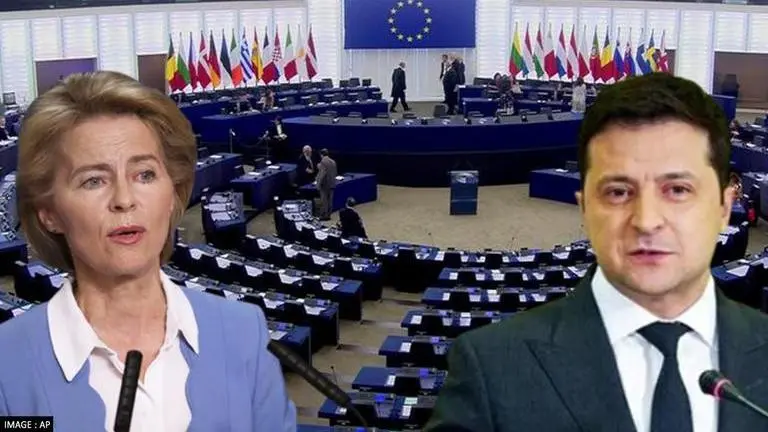Updated 11 March 2022 at 20:12 IST
EXPLAINED: What would Ukraine's membership to European Union mean for both?
The European Union's leaders have approved Ukraine's "euro-integration" almost two weeks after the nation filed an application for membership in the bloc.
- World News
- 4 min read

The European Union's leaders have approved Ukraine's "euro-integration" almost two weeks after the nation filed an application for membership in the bloc. On Friday, Lithuanian President Gitanas Nausda announced that EU leaders had agreed to grant war-torn Ukraine membership after five hours of intense discussion. The support for Ukraine's candidature was unanimous as 637 members voted 'yes' as opposed to 13 who voted 'no' and 26 who abstained from voting.
Last month, on February 28, Ukrainian President Volodymyr Zelenskyy signed the application for Ukraine's EU membership, just days after Russia launched a full-fledged war against its neighbour. Following Russia's invasion, some EU countries attempted to provide Ukraine with a pathway to EU membership, with Slovakia proposing a special procedure for the war-torn country's accession. The EU has shown extraordinary unity since the war began between Russia and Ukraine last month.
A historic night at Versailles. After five hours of heated discussions EU leaders said yes to Ukrainian eurointegration. The process started. Now it is up to us and Ukrainians to accomplish it fast. Heroic Ukrainian nation deserves to know that they are welcome in EU.
— Gitanas Nausėda (@GitanasNauseda) March 11, 2022
What EU membership means to Ukraine?
Ukraine has an association agreement with the European Union, but it has long shown interest in joining the bloc. Ukraine's admission to the bloc holds greater significance amid its war against Russia. Its admission will benefit Ukraine militarily since EU members are obliged by a mutual defence provision that mandates them to assist a country if it is the victim of military aggression on its soil. Furthermore, joining the EU would boost Ukraine's economy and provide it with extra benefits such as free movement within the EU and a slew of other rights provided to EU nationals.
EU's benefits from member states
The European Union (EU) functions as a single union for all of its members. In terms of political and economic growth, it functions as a unified organisation with a standardised legal system that includes the free movement of people, products, services, and capital within the internal market. Furthermore, the organisation investigates legislation in the areas of justice and home affairs as well. Meanwhile, the bloc also has the authority to maintain common policies on trade, agriculture, fisheries, and regional development. With the accession of Ukraine, the European Union will get an opportunity to tighten its hold in Eastern Europe.
Advertisement
EU to invest $500 million for Ukrainian armaments
The European Union immediately imposed severe sanctions against Russian President Vladimir Putin, Russia's financial system, and the country's high-maintenance oligarchs. The bloc also took the extraordinary step of collectively providing arms and ammunition to a country under attack. In addition, the EU decided to invest 450 million euros ($500 million) for Ukrainian armaments.
Criteria to join European Union
A country has to go through a lengthy and complicated procedure to become a member of the EU. Croatia was the last member to join the bloc, and its application took ten years to be officially accepted in 2013. However, Ukraine has sought immediate membership under a special fast-track procedure amid the ongoing Russian invasion. The applicant country must meet the 'Copenhagen criteria,' which are a set of requirements that must be met in order for a country to join the bloc. A free-market economy, a stable democracy, the rule of law, human rights, and the full implementation of all EU rules and regulations, are among them.
Advertisement
About European Union
The European Union is a group of 27 countries that functions as one economic unit in the world economy. The United Kingdom, which was a founder member of the EU, left the bloc in 2020. The Maastricht Treaty, which went into effect on November 1, 1993, established the European Union. In 2012, the European Union was awarded the Nobel Peace Prize in appreciation of its efforts to promote peace and democracy in Europe. Ministerial representatives from each member country make up the European Union. The council is headed by a president and the position rotates after every six months.
Image: AP
Published By : Anurag Roushan
Published On: 11 March 2022 at 20:12 IST
